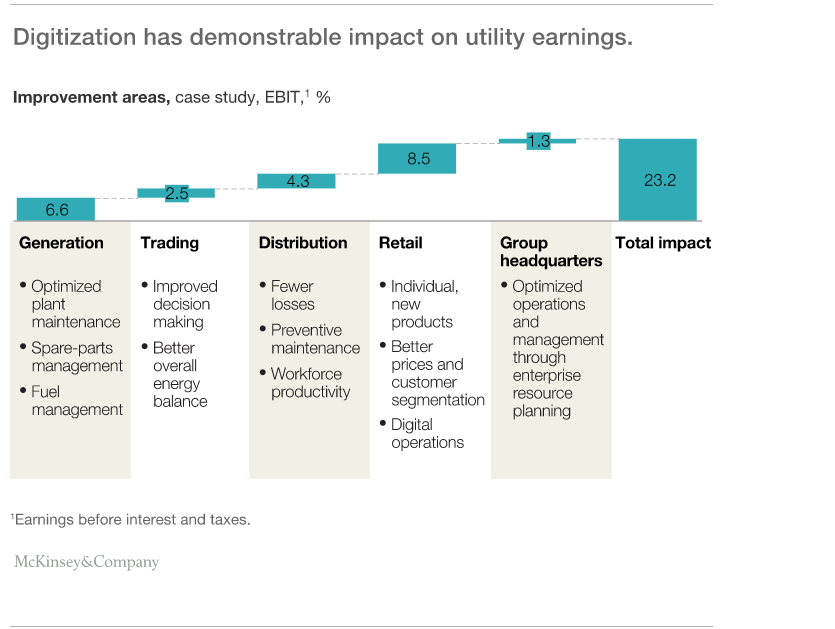How top-performing utilities are leveraging data-driven customer communication to strengthen loyalty and satisfaction
 As markets become deregulated, infrastructure ages, and new energy sources emerge, utilities need to keep the lines of communication open with their customers and strengthen customer loyalty and satisfaction. There’s more to talk about than ever!
But today’s customers, accustomed to personalized services from companies like Amazon and Uber, won’t be satisfied with a one-size-fits-all customer communication strategy. They want personalized communications through their channel of choice. Some utilities are making the right moves to meet these omnichannel needs today, while others are being left behind.
When assessing the state of customer experience, or CX, in utilities, it becomes clear that an increasingly widening gap is evolving between the highest performing utilities and those trailing behind. The difference, according to Business Wire, is in how the top-performing utilities use digital services to engage customers:
“Electric utilities around the country have been ramping up their communications efforts, often addressing everything from mobile alerts about outages to updates on citizenship initiatives. Many top-performing utilities are getting that formula right, by visibly maintaining their infrastructure and leveraging technology to ensure businesses receive timely information needed to deal with outages and support decision-making. However, several utilities are still missing the mark by not focusing on these areas that drive customer satisfaction.”
As markets become deregulated, infrastructure ages, and new energy sources emerge, utilities need to keep the lines of communication open with their customers and strengthen customer loyalty and satisfaction. There’s more to talk about than ever!
But today’s customers, accustomed to personalized services from companies like Amazon and Uber, won’t be satisfied with a one-size-fits-all customer communication strategy. They want personalized communications through their channel of choice. Some utilities are making the right moves to meet these omnichannel needs today, while others are being left behind.
When assessing the state of customer experience, or CX, in utilities, it becomes clear that an increasingly widening gap is evolving between the highest performing utilities and those trailing behind. The difference, according to Business Wire, is in how the top-performing utilities use digital services to engage customers:
“Electric utilities around the country have been ramping up their communications efforts, often addressing everything from mobile alerts about outages to updates on citizenship initiatives. Many top-performing utilities are getting that formula right, by visibly maintaining their infrastructure and leveraging technology to ensure businesses receive timely information needed to deal with outages and support decision-making. However, several utilities are still missing the mark by not focusing on these areas that drive customer satisfaction.”
– JD Power
A personal touch in utility communications requires data

Regardless of industry, customers want to be treated personally as a unique person with their own specific needs. When reviewing Customer Communications Management (CCM) in utilities, it’s clear that the most effective programs are the ones that recognize this fact and adapt accordingly.
When looking at how utilities should digitally transform customer service and communication, a common theme emerges: data is the foundation of the future utility. Modern customers expect utilities to leverage their data to create personalized and relevant interactions at every touchpoint.
Engage Customers with Data Driven Personalization and Targeted Messaging
Learn how Doxim can help you leverage data to ensure personalized customer engagement
Data-driven communications deliver great ROI
 The effective leveraging of customer data allows the utility to build customer connections. Once that data is an integrated part of the utility, operations can deliver effective, customized experiences through targeted services that help connect with those customers.
For example, applying customer data in the creation of the bill can reduce the costs associated with producing and delivering additional communications. Every time a utility must print and mail past due or shut off notices, it costs money. Even worse, the process of shutting off power and then later reinstating it for individual customers also uses precious resources and causes those customers stress.
If, however, customer data is applied earlier in the process to highlight the risk of shutoff, such as using red or bolded text in customer billing, escalation to the next steps may be avoided.
70% of low-income customers who are disconnected reconnect within 48 hours because they find a way to pay. If utilities reach these customers before disconnecting, the costly process can be avoided and the remaining 30% can be more handled in a more optimal, personalized, and cost-effective manner.
Additionally, if the utility taps into its data to determine how each individual customer typically interacts with it (e.g., paper notices vs. mobile apps vs. web portal vs. email), then it will know the optimal channel it can use to reach each customer. This knowledge can likewise prevent escalating the issue to costly shutoff.
Leveraging customer data in this way enables utilities to realize a great return on investment. Data-driven bill design and customer engagement ensures cash flow persists. Customers, meanwhile, avoid the unpleasant process of past-due notices and shutoffs.
The effective leveraging of customer data allows the utility to build customer connections. Once that data is an integrated part of the utility, operations can deliver effective, customized experiences through targeted services that help connect with those customers.
For example, applying customer data in the creation of the bill can reduce the costs associated with producing and delivering additional communications. Every time a utility must print and mail past due or shut off notices, it costs money. Even worse, the process of shutting off power and then later reinstating it for individual customers also uses precious resources and causes those customers stress.
If, however, customer data is applied earlier in the process to highlight the risk of shutoff, such as using red or bolded text in customer billing, escalation to the next steps may be avoided.
70% of low-income customers who are disconnected reconnect within 48 hours because they find a way to pay. If utilities reach these customers before disconnecting, the costly process can be avoided and the remaining 30% can be more handled in a more optimal, personalized, and cost-effective manner.
Additionally, if the utility taps into its data to determine how each individual customer typically interacts with it (e.g., paper notices vs. mobile apps vs. web portal vs. email), then it will know the optimal channel it can use to reach each customer. This knowledge can likewise prevent escalating the issue to costly shutoff.
Leveraging customer data in this way enables utilities to realize a great return on investment. Data-driven bill design and customer engagement ensures cash flow persists. Customers, meanwhile, avoid the unpleasant process of past-due notices and shutoffs.Bill design can have a large impact on your customer’s ability to understand and pay their bill. Learn how Doxim can assist you in designing bills to convey the right messages to the right customer at the right time
The cross-organizational benefits of customer communications management
Utility leaders often think of utility data as being most useful for grid operations. But, in fact, the greatest bottom-line impact that data can have happens at the retail level-where the customer is engaged and offered appropriate products:
See how we can enhance your utility company’s customer communications to effectively boost customer experience.
Future-Proof Your Utility Communication Strategy with Doxim
 As a single, trusted partner offering a holistic CCM solution that will meet all your utility customer engagement needs, Doxim can help you future-proof your utility customer experience strategy and move to a data-driven communication approach that makes every interaction count.
Doxim’s omnichannel CCM platform can empower your business users to generate the frequent, ongoing, and personal interactions your customers crave, and distribute these communications through multiple channels (via print, PDF, HTML, email, text, and online interactive experiences).
The omnichannel capabilities of the platform are such that when a customer calls in to speak to a service representative or engages with a chatbot, both human and machine can provide immediate assistance by calling up the communication or document that the customer received. This keeps every customer communication connected, making multi-step, omnichannel customer interactions a reality.
Behind the scenes, Doxim’s seasoned customer experience experts can also help you encourage customer engagement and consult on creative communication design that delivers a great user experience.
As a single, trusted partner offering a holistic CCM solution that will meet all your utility customer engagement needs, Doxim can help you future-proof your utility customer experience strategy and move to a data-driven communication approach that makes every interaction count.
Doxim’s omnichannel CCM platform can empower your business users to generate the frequent, ongoing, and personal interactions your customers crave, and distribute these communications through multiple channels (via print, PDF, HTML, email, text, and online interactive experiences).
The omnichannel capabilities of the platform are such that when a customer calls in to speak to a service representative or engages with a chatbot, both human and machine can provide immediate assistance by calling up the communication or document that the customer received. This keeps every customer communication connected, making multi-step, omnichannel customer interactions a reality.
Behind the scenes, Doxim’s seasoned customer experience experts can also help you encourage customer engagement and consult on creative communication design that delivers a great user experience.And of course, Doxim’s customer communications management technology offers you all the security and compliance features you require to keep your customers’ sensitive data secure, plus the scalability and flexible pricing you would expect from a modern SaaS-based solution.







